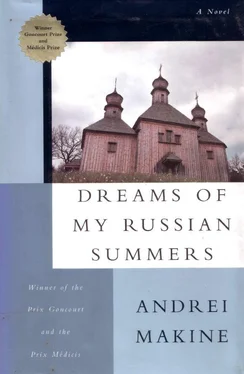I stood up on my island, I stared at this woman who was walking slowly in the current of the Sumra. And with an unfamiliar joy that suddenly filled my lungs, I whispered, "No, she won't die." And at once I longed to understand whence this serene assurance came, this confidence, which was so strange, especially in the year marked by the death of my parents.
But instead of a logical explanation I saw a flood of moments streaming by in a dazzling disorder: a morning filled with sunlit mist in an imaginary Paris; the breeze redolent of lavender filling a railway carriage; the cry of the Kukushka in the warm evening air; that distant moment of the first snow that Charlotte had watched swirling around on that terrible night of the war; and also this present moment – this slim woman, with a white scarf over her gray hair, a woman strolling absentmindedly in the clear water of a river that flows through the heart of the endless steppe…
These visions seemed to me both ephemeral and endowed with a kind of eternity. I felt an intoxicating certainty; in a mysterious way they made Charlotte's death impossible. I sensed that the encounter with the young woman beside the frosted window in the black izba – the icon on the ice! – and even Gavrilych's story – the reeds, the young fish, an evening in the war – yes, even these brief flashes of illumination contributed to the impossibility of her death. And the most wonderful thing was that there was no need to prove it, to explain it, to argue it. I looked at Charlotte, climbing onto the bank to sit in her favorite spot under the willows, and I repeated to myself, as if it were something luminously obvious: "No, all those moments will never disappear…"
When I came beside her, my grandmother looked up and said to me, "This morning, you know, I copied out two different translations of a sonnet by Baudelaire for you. Listen, I'm going to read them to you. It will amuse you…"
Thinking that I was in for one of those stylistic curiosities that Charlotte liked to unearth for me in her reading, often in the form of a riddle, I concentrated, eager to show off my knowledge of French literature. I did not dream that this sonnet by Baudelaire would be a veritable liberation for me.
It is true that Woman, during those summer months, had imposed herself on all my senses like a ceaseless oppression. Without knowing it, I was living through that painful transition that lies between the very first experience of physical love, often barely sketched in, and those that will follow. This is often a more delicate path to travel than the one that leads from innocence to the first knowledge of a woman's body.
Even in the marooned town that was Saranza, this multifarious woman, elusive, innumerable, was strangely present. More insinuating, more discreet than in the big cities, but all the more provocative. Like, for example, the girl whom I passed one day in an empty street, dusty and scorched by the sun. She was tall, well built, with that healthy physical robustness that one finds in the provinces. Her blouse clung to powerful rounded breasts. Her miniskirt hugged the very full tops of her thighs. The pointed heels of her glossy white shoes made her gait a little strained. Her fashionable clothes, her makeup, and this stilted gait lent an almost surrealist air to her appearance in the empty street. But above all there was this almost brutish physical superabundance of her body, of her movements! On this afternoon of silent heat. In this sleepy little town. Why? To what end? I could not prevent myself glancing furtively behind me: yes, her strong calves, polished by sunburn, her thighs, the two hemispheres of her buttocks moving with suppleness at each step. Bewildered, I told myself that somewhere in this dead Saranza there must be a room, a bed, where this body would stretch out and, parting its legs, welcome another body into its groin. This obvious thought plunged me into boundless amazement. How simultaneously natural and improbable it all was!
Or again the plump, bare woman's arm that appeared at a window one evening. A little winding street, overhung with still, heavy foliage – and this very white, very rounded arm, uncovered to the shoulder, which had swayed for a few seconds, the time it took to draw a muslin curtain over the darkness of the room. And I do not know by what intuition I had recognized the somewhat excited impatience of this gesture, and had understood on what interior this naked woman's arm was drawing the curtain… I even felt the smooth coolness of the arm on my lips.
At each of these encounters, an insistent summons rang out in my head: I must seduce them at once, these unknown women, make them mine, fit their flesh into my rosary of dreamed-of bodies. For each missed opportunity was a defeat, an irremediable loss, an emptiness that other bodies would only partially be able to fill. At such moments my fever became unbearable!
I had never dared to embark on this subject with Charlotte. Still less to talk to her about the woman cut in two on the barge, or my night with the young drunken dancer. Did she guess at my turmoil herself? Certainly. Without actually picturing that prostitute seen through the portholes, or the young redhead on the old ferry, it seems to me that she identified with great precision "where I was at" in my experience of love. Unconsciously, through my questions, my evasions, my feigned indifference over certain delicate subjects – my silences, even – I was painting my own portrait as apprentice lover. But I was not aware of it, like someone who forgets that his shadow is projecting onto a wall the gestures he is trying to hide.
Thus, hearing Charlotte speak of Baudelaire, I thought it was mere coincidence when in the first stanza of his sonnet, this feminine presence was sketched:
When, with closed eyes, on some warm autumn night, I breathe your bosom's sultry fragrances, Enchanted shores unfold their promontories, Dazed by a sun monotonously bright.
"You see," my grandmother continued, in a mixture of Russian and French, for she had to quote the texts of the translations, "In Bryussov the first line is rendered as: 'On an autumn evening, with eyes closed…'
"In Balmont: 'When, closing my eyes, on a stifling summer's night…'
"In my opinion both of them are simplifying Baudelaire. In his sonnet, you see, the 'warm autumn night' is a very particular moment, yes, in mid-autumn, suddenly, like a blessing, this warm night, unique, a parenthesis of light amid the rains and miseries of life. In their translations they have traduced Baudelaire's idea: 'an autumn evening,' 'a summer's night,' is flat. It has no soul. While in his text this moment makes magic possible, you know, a bit like those warm days just before the winter."
Charlotte elaborated her commentary at every stage with the hghtly assumed dilettantism that disguised her often very broad knowledge, which she was afraid to flaunt. But now all I was hearing was the melody of her voice, sometimes in Russian, sometimes in French.
In place of my obsession with female flesh, with that omnipresent womanhood whose inexhaustible multiplicity harassed me, I had a feeling of great relief. This had the transparency of that "warm autumn night." And the serenity of a slow, almost melancholy contemplation of a woman's beautiful body, stretched out in the blissful lassitude of love. A body whose physical reality is reflected in a series of reminiscences, scents, lights…
Before the storm reached us, the river became swollen. We shook ourselves, hearing the stream already lapping among the roots of the willows. The sky became purple, black. The steppe, bristling, froze into blinding, livid scenes. A piquant, acid smell assailed us with the chill of the first showers. And Charlotte, as she folded the napkin on which we had taken our lunch, rounded off her exposition: "But in the end, in the last line, there is a real paradox of translation. Bryussov excels Baudelaire! Yes, Baudelaire talks of 'the song of mariners' on that island that is born of 'your bosom's sultry fragrances.' And Bryussov, in translating him, gives 'the voices of sailors calling in several tongues.' What is wonderful is that the Russian can convey that with a single adjective. These cries in different languages are much more alive than the'song of mariners,' which is rather mawkishly romantic, you have to admit. It's what we were saying the other day, you see: the translator of prose is the slave of the author, and the translator of poetry is his rival. Besides, in this sonnet…"
Читать дальше












